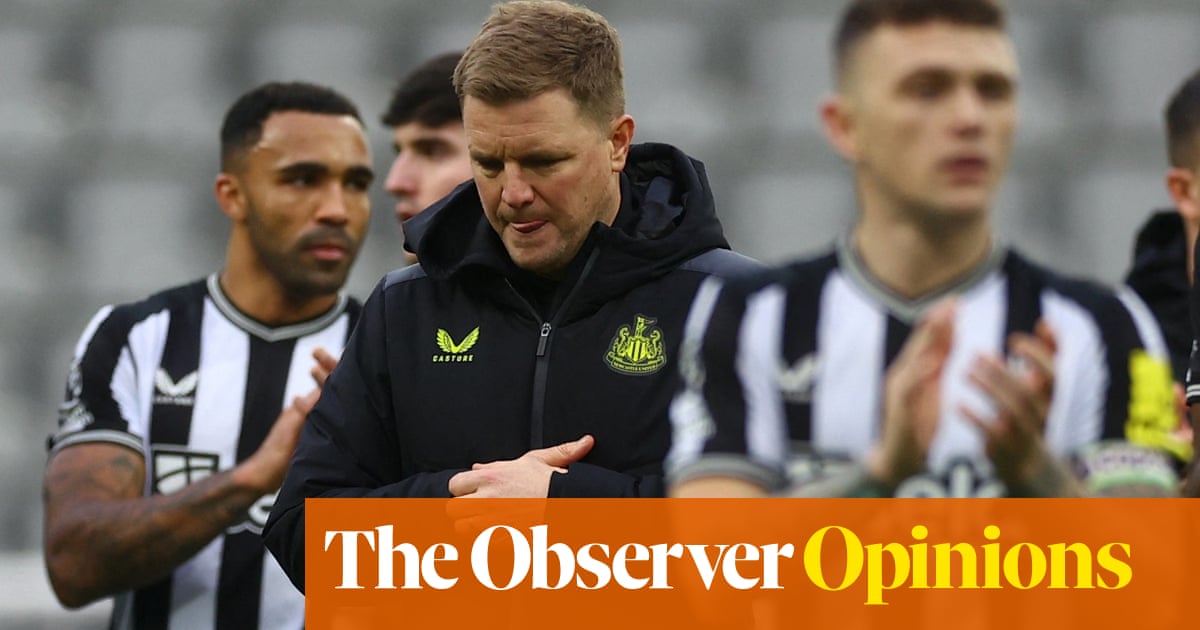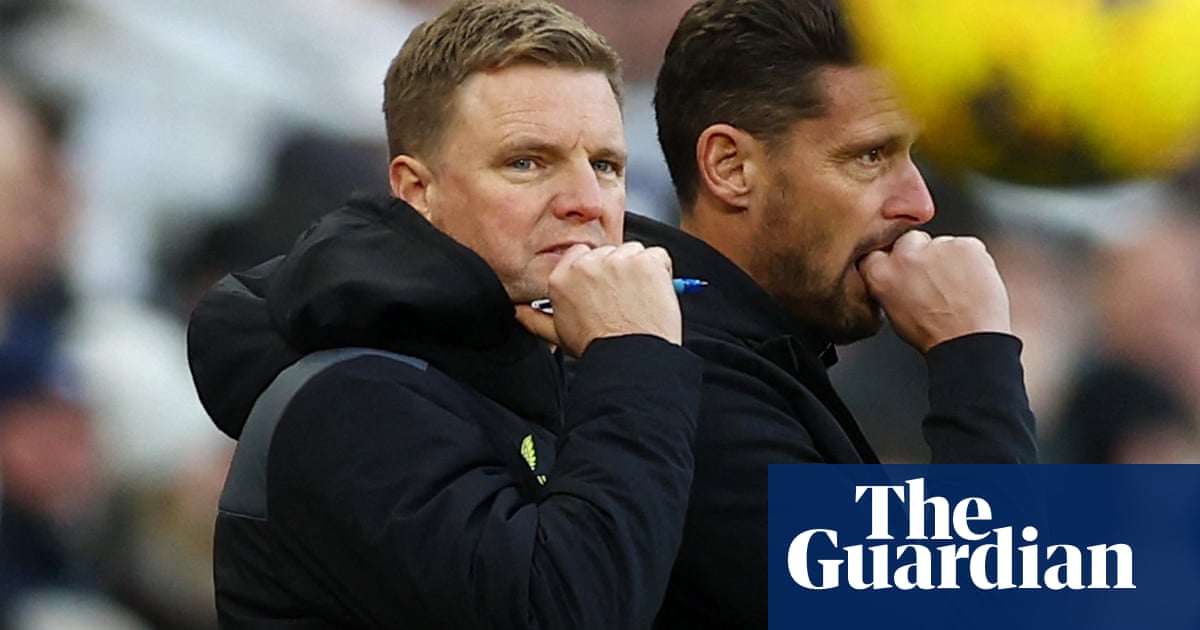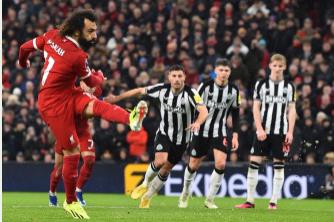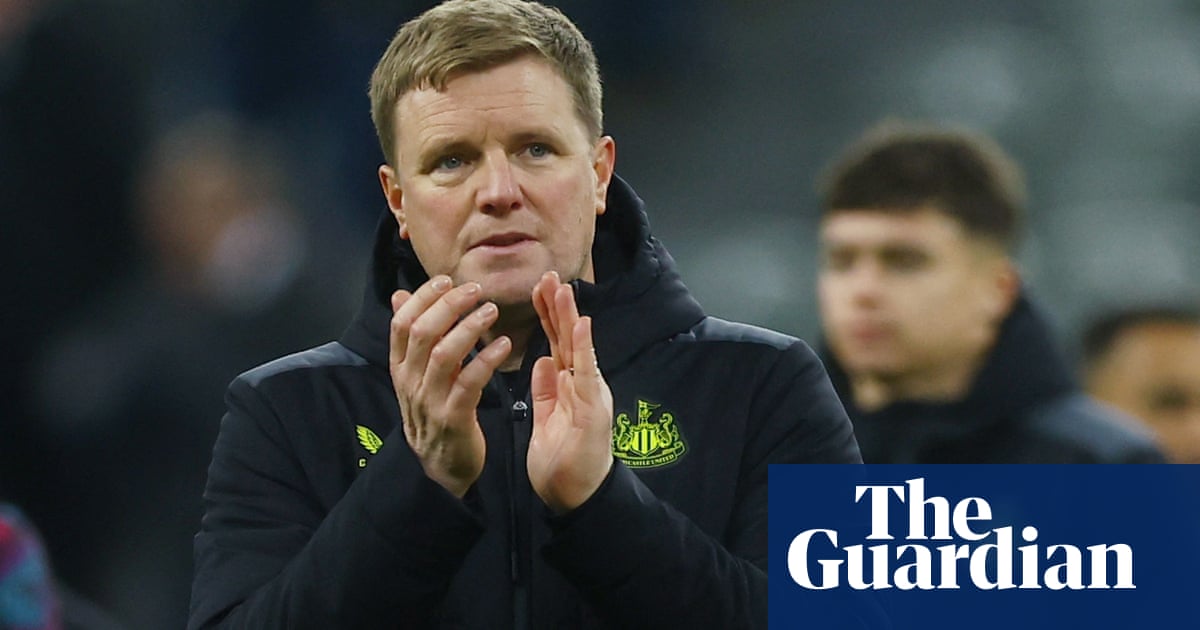
When results go awry, football clubs tend to have only one response. Sometimes the act is undertaken with a sense of ruthlessness, sometimes relief, sometimes with the dutiful sombreness of somebody taking a faithful labrador to the vet for the final time, but always there is a feeling of necessity. “I’m sorry, Nigel/Antonio/Steve, but there’s no other way.” Inevitably, though, the result is the same: whatever is going wrong at the club, however good a job has been done before, the manager is the one who takes the blame.
That is just the nature of the modern game. Managers may just about be given time to work their way through a dip, but nobody ever sees the other side of a slough. Which should concern Eddie Howe. Newcastle are in a dip at the moment, the Christmas defeats by Luton and Nottingham Forest meaning they have lost eight of their last 12 games. They are out of the Champions League and the Carabao Cup and, while Champions League qualification is not out of range, a small gap is beginning to open. And January looks tough.
In the Premier League, Newcastle face Liverpool at Anfield on Monday, then host Manchester City and travel to Aston Villa. Between those first two Premier League games of the year they face perhaps the worst FA Cup tie imaginable, away at Sunderland.
It’s a game with very little upside for Newcastle, however welcome would be a first victory over their local rivals since 2011. Even if they win comfortably, that’s just what a Saudi-enhanced club should do against opposition from a division below. Lose and it is a game that will be talked about for years. The risk is not just going out of the Cup – in some ways, an early exit might be advantageous in allowing them to focus on qualifying for the Champions League once again – but of an embarrassment that would resonate.
Directors would almost certainly prioritise the league: that is where the money is and it is through Champions League qualification that the club can establish their reputation and attract the highest level of signings. Fans can probably understand that but defeat by Sunderland would be intolerable. Any resting of players, weakening of the side, comes with enormous risk – but so too does not weakening the side.
The temptation with Newcastle is always to compare their progress under the Saudi Public Investment Fund with Manchester City’s under Sheikh Mansour. Mark Hughes had been appointed as City manager in June 2008, three months before the takeover. Although there was always a sense he was there on sufferance, he lasted 18 months. City finished 10th in his first season in charge but they were sixth in December 2009 when he was sacked after a 4-3 win over Sunderland.
Only that morning had news broken that his job was under threat, and there was a degree of disquiet among fans at the unexpected nature of the decision. In retrospect, a string of draws followed by a 3-0 humbling at Tottenham had undermined him, and the ease with which Roberto Mancini settled into the job meant reservations over Hughes’s treatment were soon forgotten.
The situations aren’t quite comparable. City were unencumbered by any regulations on spending and were starting from a higher base. By the time Hughes was sacked, they could field a side featuring Pablo Zabaleta, Vincent Kompany, Nigel de Jong, Gareth Barry, Emmanuel Adebayor and Carlos Tevez. The squad was both stronger and deeper than Newcastle’s is now – which serves to emphasise what a remarkable job Howe did last season to get his side into the Champions League; a success for which he is perhaps paying the price now.
Imagine Newcastle had finished eighth last season and had not had the Champions League to contend with; a less weary squad – albeit one perhaps lacking Harvey Barnes and Sandro Tonali, not that either, for differing reasons, has played a huge part this season – might have Newcastle looking set fair for Europa League qualification.
Which would be fine – and most at Newcastle probably realise that. Although there were some boos after the defeat by Forest, there is no serious fan discontent with Howe. But then there wasn’t with Hughes. Given the schedule, not much would have to go wrong for Newcastle to fail to pick up a league win in January. If that happened, particularly if Newcastle go out of the Cup, it would be hard, even for the most realistic fans, not to regard this season as a step backwards. Perhaps a necessary consolidating step, but would the Saudis see things that way? The sporting director, Dan Ashworth, might be a voice of restraint, but it’s hard to believe there wouldn’t be conversations about a possible future without Howe.
Tiredness and injuries may be a reasonable excuse for Newcastle, but is the situation really worse than at Tottenham, Manchester United, Chelsea, Brentford or Brighton? And there are broader concerns. Newcastle have picked up a single point from a losing position this season – and that was in the 2-2 draw at West Ham, a game in which they had scored first. Losing leads, meanwhile, has become a habit: critically, against Paris Saint-Germain and Milan in the Champions League, but also against Liverpool, West Ham, Wolves (twice), Chelsea in the Carabao Cup and then Nottingham Forest on Boxing Day.
It may be that is simply the result of fatigue, but these issues tend to become self-fulfilling. Come from behind often enough and you start to believe comebacks are an inherent part of the club’s character; lose enough leads and the same sense of fatalism can set in on the other side. Fostering such patterns when they are positive or breaking them when negative is part of the weaponry of a manager.
Is Howe capable of breaking the pattern? Can he find a way of playing that doesn’t place huge physical demands on already tired players? Can he restore waning belief? If he cannot, if the slide continues, he may find himself like Hughes, an often-forgotten preamble to the more dramatic story to come.












